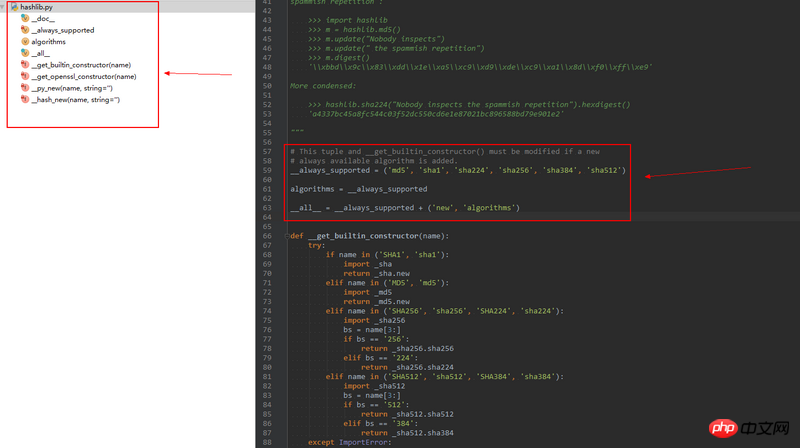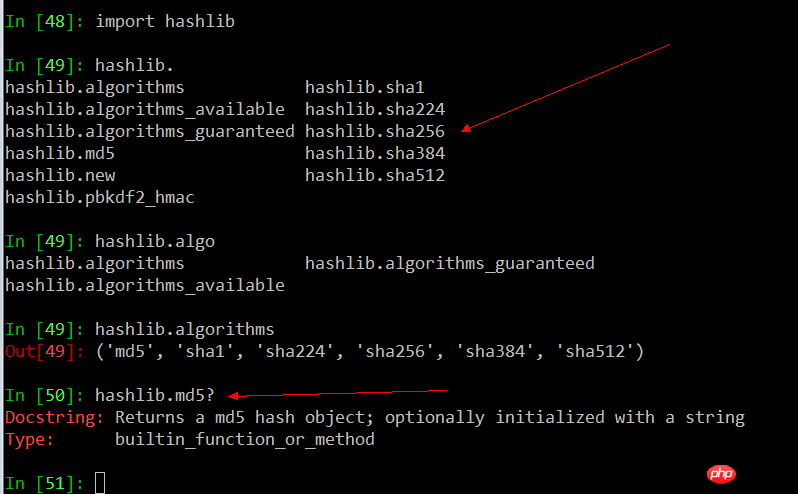- communauté
- Apprendre
- Bibliothèque d'outils
- Loisirs
Maison > Questions et réponses > le corps du texte
1 在hashlib.py中貌似找不到md5()这些东西
2 hashlib.py也没有import什么东西


ringa_lee2017-04-17 17:37:01
Comme il existe des calculs numériques similaires à Crypto dans hashlib, s'ils sont effectués uniquement en python, la vitesse sera très lente et ne pourra pas répondre aux exigences. Par conséquent, cette implémentation spécifique est placée dans _hashlib.pyd. , le chemin se situe C:Python27DLLs_hashlib.pyd, cette bibliothèque dynamique implémentée en C
import hashlib
print help(hashlib.md5)
import _hashlib
print help(_hashlib.openssl_md5)
# 生成的MD5值一样
S = "this is a demo for md5"
assert hashlib.md5(S).hexdigest() == _hashlib.openssl_md5(S).hexdigest()
Le processus de chargement est :
try:
import _hashlib
new = __hash_new
__get_hash = __get_openssl_constructor
algorithms_available = algorithms_available.union(
_hashlib.openssl_md_meth_names)
except ImportError:
new = __py_new
__get_hash = __get_builtin_constructor
for __func_name in __always_supported:
# try them all, some may not work due to the OpenSSL
# version not supporting that algorithm.
try:
globals()[__func_name] = __get_hash(__func_name)
except ValueError:
import logging
logging.exception('code for hash %s was not found.', __func_name)
try:
# OpenSSL's PKCS5_PBKDF2_HMAC requires OpenSSL 1.0+ with HMAC and SHA
from _hashlib import pbkdf2_hmac
except ImportError:
import binascii
import struct
_trans_5C = b"".join(chr(x ^ 0x5C) for x in range(256))
_trans_36 = b"".join(chr(x ^ 0x36) for x in range(256))
def pbkdf2_hmac(hash_name, password, salt, iterations, dklen=None):
"""Password based key derivation function 2 (PKCS #5 v2.0)
This Python implementations based on the hmac module about as fast
as OpenSSL's PKCS5_PBKDF2_HMAC for short passwords and much faster
for long passwords.
"""
if not isinstance(hash_name, str):
raise TypeError(hash_name)
if not isinstance(password, (bytes, bytearray)):
password = bytes(buffer(password))
if not isinstance(salt, (bytes, bytearray)):
salt = bytes(buffer(salt))
# Fast inline HMAC implementation
inner = new(hash_name)
outer = new(hash_name)
blocksize = getattr(inner, 'block_size', 64)
if len(password) > blocksize:
password = new(hash_name, password).digest()
password = password + b'\x00' * (blocksize - len(password))
inner.update(password.translate(_trans_36))
outer.update(password.translate(_trans_5C))
def prf(msg, inner=inner, outer=outer):
# PBKDF2_HMAC uses the password as key. We can re-use the same
# digest objects and just update copies to skip initialization.
icpy = inner.copy()
ocpy = outer.copy()
icpy.update(msg)
ocpy.update(icpy.digest())
return ocpy.digest()
if iterations < 1:
raise ValueError(iterations)
if dklen is None:
dklen = outer.digest_size
if dklen < 1:
raise ValueError(dklen)
hex_format_string = "%%0%ix" % (new(hash_name).digest_size * 2)
dkey = b''
loop = 1
while len(dkey) < dklen:
prev = prf(salt + struct.pack(b'>I', loop))
rkey = int(binascii.hexlify(prev), 16)
for i in xrange(iterations - 1):
prev = prf(prev)
rkey ^= int(binascii.hexlify(prev), 16)
loop += 1
dkey += binascii.unhexlify(hex_format_string % rkey)
return dkey[:dklen]
# Cleanup locals()
del __always_supported, __func_name, __get_hash
del __py_new, __hash_new, __get_openssl_constructor